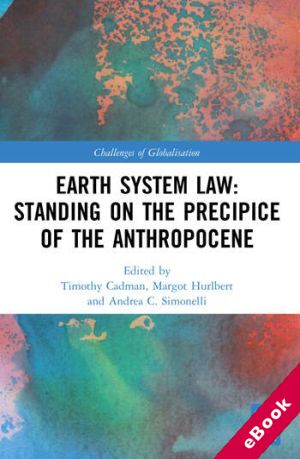
The device(s) you use to access the eBook content must be authorized with an Adobe ID before you download the product otherwise it will fail to register correctly.
For further information see https://www.wildy.com/ebook-formats
Once the order is confirmed an automated e-mail will be sent to you to allow you to download the eBook.
All eBooks are supplied firm sale and cannot be returned. If you believe there is a fault with your eBook then contact us on ebooks@wildy.com and we will help in resolving the issue. This does not affect your statutory rights.
This book systematically explores the emerging legal discipline of Earth System Law (ESL), challenging the closed system of law and marking a new era in law and society scholarship.
Law has historically provided stability, certainty, and predictability in the ordering of social relations (predominantly between humans). However, in recent decades the Earth’s relationship in law has changed with increasing recognition of the standing of Mother Earth, inherent rights of the environment (such as flora and fauna, rivers), and now recognition of the multiple relations of the Anthropocene. This book questions the fundamental assumption that ‘the law’ only applies to humans, and that the earth, as a system, has intrinsic rights and responsibilities. In the last ten years the planet has experienced its hottest period since human evolution, and by the year 2100, unless substantive action is taken, many species will be lost, and planetary conditions will be intolerable for human civilisation as it currently exists. Relationships between humans, the biosphere, and all planetary systems must change. The authors address these challenging topics, setting the groundwork of ESL to ensure sustainable development of the coupled socio-ecological system that the Earth has become.
Earth System Law is an interdisciplinary and transdisciplinary research project, and, as such, this book will be of great interest to researchers and stakeholders from a wide range of disciplines, including political science, anthropology, economics, law, ethics, sociology, and psychology.